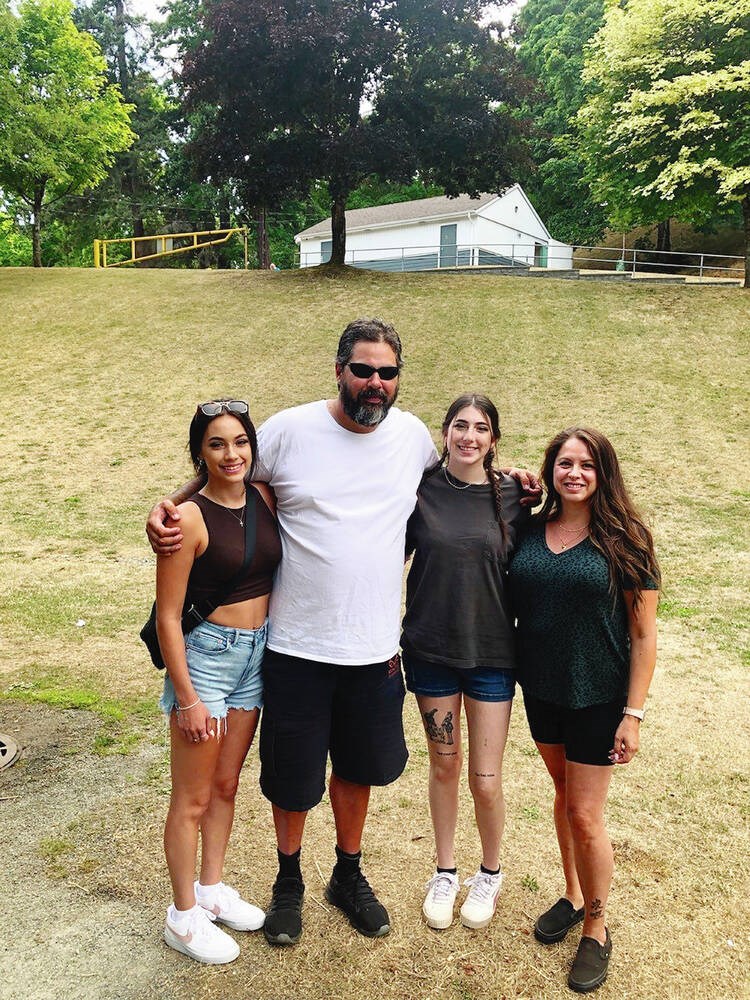60s Scoop | Michael John Lo
He was determined to change his life, so he rode a bike from Moncton to Nanaimo

Chris Aubichon has spent the past three months cycling across the country in a bid to raise awareness of post-foster-care life and men’s mental health — and to begin a second chapter of his own life.
The 44-year-old father of three reached the finish line at Bowen Park in Nanaimo on Friday evening, where he was greeted by a cheering group of supporters.
After 20 years living in Eastern Canada, he’s returning to finish his education, which he stopped pursuing at the age of 12.
“This is part two of my life,” he said.
Aubichon, born in Prince George and raised in Nanaimo, is of mixed Indigenous and Metís heritage; he was a ward of the court from the age of six to 18.
His mother, who is of Tla’amin descent, was raised by a white Catholic family and was part of the Sixties Scoop.
“She had her own demons,” he said, adding that her mother was born in a residential school.
His grandmother died of a drug overdose in Vancouver’s Downtown Eastside after leaving residential school, he said.
Aubichon said he has overcome his substance abuse and addiction issues, stemming from his upbringing, which involved experiences of sexual abuse in group homes.
But his mental health remains a persistent challenge, one that has cost him jobs, relationships, and housing.
“It doesn’t matter how badly you want to get up and go to work. You’re not getting up,” he said.
It’s part of the reason why he chose to bike back to Nanaimo.
“If I jumped on a plane and flew across the country, I’m going to be the same man that got there that left, and that man isn’t going to find success,” he said.
But someone who’s able to bike across most of Canada?
“The man that can do that can surely be successful at school,” he said.
On May 11, Aubichon found a mountain bike that could hold his 320-pound frame, loaded it up with camping gear and started pedalling.
He didn’t even inform his family until he was halfway to Fredericton.
His sister Jenn, initially skeptical of the whole ordeal, had only one request: that he document his journey, both the highs and the lows.
Aubichon agreed, even though he thought that no one would care. But his journey would be followed by thousands on social media, and even catch the eye of government ministers.
The initial days were the hardest, a constant fight against severe cramps, back spasms, and shoulder pains resulting from a life of smoking, drinking and neglect, he said.
“Physically, I was only making it 15 or 20 kilometres a day,” he said. “I could pedal for maybe 15 seconds and I would have to stop, and my legs would cramp up.”
But the real battle was in the mind, he said.
Aubichon has bipolar disorder, depression, and chemically-induced anxiety disorder, which has cost him jobs, relationships, and housing.
“There were days where I’m just riding down the roads and just literally crying,” he said.
But bit by bit, the gears felt lighter on his feet, and every day he would ride further until he was travelling 120 kilometres per day.
That’s not to say there weren’t other challenges.
Wildfires in Northern Ontario dogged his steps. Vicious headwinds and sweltering weather accompanied much of his journey through Western Canada.
The Rockies were brutal, and he was forced to detour from the Coquihalla due to yet another wildfire, near Merritt.
Twice, he was thrown off his bike in northern Ontario by the buffeting winds of camping vehicles passing him with only 12 inches of clearance.
On the western outskirts of Winnipeg, his bike was stolen outside of a Tim Hortons.
But an emotional dispatch on social media went viral and people donated money to replace his gear and supplies.
There were many such instances of kindness on his journey, he said, adding that an older man in North Bay, Ont. slipped him $50 without knowing that Aubichon was starving that day and couldn’t afford to eat.
People have invited him into homes, waited on the sides of a highway for hours just to encourage him on his journey, he said.
“I’m still a big man, but I’m in great shape,” he said, adding that he’s probably lost 50 pounds since he started. “I have a clarity that I’ve never had in my life, and mentally I feel stronger than I ever have.”
Aubichon now wants to help others through a bike support group and advocate for better supports for youth aging out of care, who are overrepresented in homeless populations.
Many people living in tents right now are former wards of the state, sent out to fend for themselves at an early age, he said.
“A lot of what they're dealing with is not their fault.”






















No comments:
Post a Comment
Please: Share your reaction, your thoughts, and your opinions. Be passionate, be unapologetic. Offensive remarks will not be published. We are getting more and more spam. Comments will be monitored.
Use the comment form at the bottom of this website which is private and sent direct to Trace.